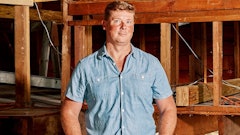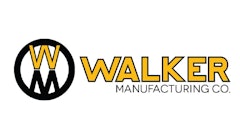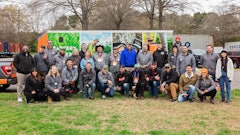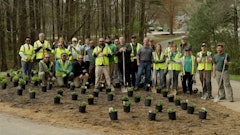
No one can say Estate Gardeners wasn't a successful company when its owners decided to dismantle and rebuild it. But they did it anyway.
From its humble beginnings in 1993, when Michael Becker lashed raspberry brambles to the roof of his Toyota Tercel and his wife Patricia Burleson delivered sod in her Honda Civic, the company grew to be financially successful and recognized for its artistic and ethical excellence.
By the time of the reorganization it had been featured in the Omaha World-Herald, earning it earning it name recognition and job leads across the region. The area Better Business Bureau bestowed its 2005 Integrity Award on the company for its high ethical standards. It was also recognized many times for its work, including the Professional Landcare Network's 2006 Environmental Improvement Award of Distinction.
There was just one problem. A fan of Jim Collins' bestselling book, "Good to Great: Why Some Companies Make the Leap... and Others Don't," Michael says he realized the company needed to be taken to the next level. "One of the lessons of the book is that good is the enemy of great. Good is a momentum killer; it's easy to be satisfied with good and never seek to become exceptional. We were guilty of that, business wise."
He realized that the primary problem was that the company was resting on its owners' shoulders, and its success to that point had increased the burden until it became unbearable. Michael says that he had become both the company's most important asset and its biggest liability.
"I realized I was limiting the company's progress because nearly everything had to be relayed through my head—sales, marketing, scheduling, bookkeeping, purchasing, project management, and on and on. We were doing excellent work and pleasing customers, but nothing else was getting the attention it deserved, because I was doing the bare minimum to get by. It was very stressful and it wasn't fun."
And that's why he and Patricia decided to start again from scratch.
A new roster
In January 2006, they were the only two people left in the company. Weeks before they had told the full-time staff that things were going to change and that the company was going to operate under a much tighter structure. The staff quit.
"We had anticipated that they would," says Michael. "There really wasn't animosity, but most people simply don't like change. We were very clear that the company culture was going to be rebuilt on process and structure, and they weren't comfortable with that."
Working with consultant (and PLANET president-elect) Jason Cupp, Michael and Patricia went about creating job descriptions, a new business plan and a budget. Within 30 days, they were ready to set about the first big task — finding the best employees.
"We decided we had to put a lot more effort into the hiring process, to not just fill the roster with warm bodies and hope for the best. We needed to find people who want to work in landscaping and for Estate Gardeners in particular, not those just looking for a job," he says, noting that one of the principles in "Good to Great" is to start with "who," not "where" or "what."
Michael says having detailed job descriptions is a great help in interviews. It allows him to ask candidates whether they're capable of performing specific tasks and, more importantly, to judge whether they have any objection to performing them. But one of the major changes he made was to focus on candidates' intelligence, charisma and character, rather than skill. He says this was both due to necessity-most skilled and experienced workers are nabbed by large companies in his market-and his own experience.
"We can give employees the knowledge, but we can't teach character," Michael says. "We once had an employee who was exceptionally skilled and seemingly indispensable; he was great at taking my ideas and putting them into action. But he also undermined anyone he considered a rival. He was a cancer on morale and was driving people away, which we only found out later. It was like cutting off my right arm, but we had to let him go."
Getting on the same page
One of the hiring tools acquired from Jason Cupp also helped Michael identify another threat to morale-himself. The company uses the Kolbe Index, originally developed by education experts to measure "the instinctive action and problem-solving styles of individuals," to match the right candidates with the right job and to manage them more effectively.
"The Index tells us how people process information. A "fact finder,' for example, wants to know everything there is to know before starting a task," Michael says. "That's ideal for, say, someone putting together an estimate. But not for a salesman, who has to work more from the gut.
"I discovered that I'm an odd duck and that I work differently from anyone else in the company. I tend to jump from A to Z, where others want to hear A, B, C, D and so on. I just want to hear the problem and the solution, not the explanation. It's a struggle for me to operate at that level of detail and a struggle for them to do without that detail."Now that he knows what to look for, Michael says he can see employees' frustration level rising and change his tactics before a conflict develops. "I now know that it's not the employee's comprehension problem; it's me. When the frustration starts building, I take a breath, step out of my natural way of looking at things and give them the information they need.
Breaking the
information logjam
Relatedly, Michael worked to improve the flow of information throughout the company. He says each stage of the company's work is now expressed in writing, from the estimate to the invoice.
"It forces me to put down details in a format that others can utilize, instead of keeping it all in my head and giving verbal orders. We have a paper trail that includes all the information about a job moves through the process, from the time it's sold to materials purchase. And we do a lot more tracking of everything—time, materials, service orders, and so forth—with more detail. I went out and inventoried leftover materials and found $23,000 of stuff that wasn't on the books."
The emphasis on information has also given Michael a better grip on where the company stands at any given moment, and allows him to head off problems before they become crises. "Before, we were watching dollars; now we're watching pennies. Our numbers are real-time, not a broad-brush look at the end of the month. I can look within a two- to three-day window and see what's actually being produced and what's actually being billed."
What's more, he says, systematizing the information process and making it independent of his thought process allows him to delegate.
"We hired a semi-retired electrician, Steve Short, for the field but he's really become my assistant. We didn't know what he was capable of, but soon discovered his hidden talents. I can hand him a drawing I made with a Sharpie, and he can draft it, label it and even estimate it. He's producing all my working documents, freeing up my time to focus on the creative overview. And now we get better information to the field, rather than a crew going out with something I put together in an hour."
Looking back, Michael says he now understands that poor communication had been one of the biggest roadblocks to improving efficiency and removing some of the management burden from his shoulders.
"I was so overloaded that I'd only give them the information they needed to get through the day," he says. "They weren't getting the big picture, and they couldn't anticipate what was coming next. That led to a lot of mistakes and inefficiency, which only increased the pressure on me. Had they known what came next, they might have been able to avoid having one task interfere with another.
"Having that information empowers employees to make the right call on their own. And it's just frustrating and uncomfortable operating in the dark. People want to know what's coming two or three days down the road."
Creating a culture
Communication is more than paperwork, and the relationship with employees goes beyond the jobsite. With a new staff of motivated employees on board, Michael and Patricia set about creating a company culture that allows everyone to thrive.
At the core of Estate Gardens' culture is professionalism—a commitment to excellence not only in relation to customers, but within the company, as well. And as with customers, demonstrating professionalism to employees means maintaining high standards and meeting commitments.
"There's nothing that kills morale faster than lip service," says Michael. "I strive not to promise anything I can't deliver. I don't even think it."
A Certified Landscape Professional himself and chair-elect of PLANET's International Certification Council, Michael utilizes the certification program not only to demonstrate standards to clients but staff, as well. He uses it as a structured training program and as a means for employees to advance up the career ladder.
Regular safety meetings and a commitment to enforcing safety rules are also part of the message. "The training and safety programs demonstrate that we're serious about what we're doing, and that we care about and respect the people we work with."
Michael also makes it a point to have regular, high-level discussions with employees not related to the day-to-day grind. "It helps to talk about the big picture on a regular basis. It's easy to get everyone motivated about our mission, but then we run up against the real world.
"We go out and get tired and dirty, and along with successes we have frustrations. It's good to take a break now and then, talk about the philosophy behind what we're doing and ask if we're on the right track. We also get great feedback; we'd be foolish not to take advantage of our employees' great ideas."
Big results
Michael says the past 18 months have been some of the toughest in the life of the company, but at the same time the most rewarding. "We've had major disappointments and major successes. It's still a struggle sometimes, and we're still striving toward "great.' But we knew this would be a two- to three-year process going in, and we're in the midst of it."
Even so, the struggle has brought results, both tangible and intangible. Michael says the company is producing 20% more with 30% fewer staff. New office manager Kathi Blaine has tamed the paperwork flow, and was inspired to whittle all receivables under 20 days.
"It's amazing how our people have stepped up to the plate. When everyone is at the top of their game and also works together as a team, our force is multiplied many times over."



























